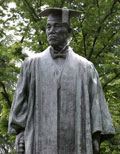Welcome to ISTCP-VII Web Site
 September 2-8, 2011
September 2-8, 2011
Waseda University, Tokyo, Japan
The Seventh Congress of the
International Society for Theoretical
Chemical Physics (ISTCP-VII) took place on September 2-8, 2011 at
Waseda University, Tokyo, Japan.
NEWS!
ISTCP-VII Proceedings have been published in special issues of
International Journal of Quantum Chemistry.
(Part I,
Part II)
NEWS!
ISTCP-VII has been successfully completed. We thank all the people who have
contributed to and/or supported ISTCP-VII.
NEWS!
Fujitsu Poster Prize winners were announced.
NEWS!
Photos were uploaded.
NEWS!
Next ISTCP Congress (ISTCP-VIII) will be held in 2013 in Budapest, Hungary.
A Congress is organized by ISTCP every three years.
A total of 375 participants from 36 countries attended the last Congress.
The venues of the past Congresses have been:
- ISTCP-I (1993) in Girona, Spain
- ISTCP-II (1996) in New Orleans, USA
- ISTCP-III (1999) in Mexico City, Mexico
- ISTCP-IV (2002) in Paris, France
- ISTCP-V (2005) in New Orleans, USA
- ISTCP-VI (2008) in Vancouver, Canada
You can read the history of ISTCP via the link
here.
The main theme of this Congress "theoretical chemical physics"
has recently attracted considerable attention owing to the recent developments
in theoretical methodologies and advances in computer technologies
such as massive parallel computers.
Theoretical chemical physics is an indispensable means to carry out
scientific research.
This Congress will cover not only theoretical methodologies in
quantum chemistry, dynamics, and statistical mechanics but also the
applications of theoretical chemical physics to material science,
biochemistry, and biophysics.
This Congress will offer an excellent opportunity to present cutting-edge
research and exchange ideas.
More specific themes in ISTCP-VII include:
- Concepts and Fundamental Methods in Quantum Chemistry:
Relativistic theory, Next-generation molecular theory.
- Frontiers in Wave Function Theory:
Coupled cluster, Explicitly-correlated theories, Multi-reference theories,
Static correlation, Quantum Monte Carlo.
- Frontiers in Density Functional Theory:
Exchange-correlation functional, Range separation, Dispersion interaction,
Multi-reference DFT, TDDFT, RPA, OEP.
- Computational Quantum Chemistry:
Large systems, New algorithms, Massive parallel computing,
Quantum chemistry programs.
- Concepts and Fundamental Methods in Molecular Simulations:
Quantum dynamics, Electron dynamics, Non-adiabatic effects,
Statistical mechanics.
- Frontiers in Molecular Simulations:
Multi-scale dynamics, QM/MM/MD, Coarse-grained simulation,
Excited state dynamics.
- Computations of Molecular Structures, Properties, and
Spectroscopies:
Excited states, Molecular vibrations, Potential energy surfaces, Chemical bonds,
Bonding nature, Intermolecular interaction, Transition-metal chemistry,
NMR, CD, IR, Raman.
- Computations of Chemical Reactions and Dynamics:
Catalytic reactions (heterogeneous and homogeneous), Surface science,
Enantioselective synthesis, Photo catalyst.
- Computations of Structures, Properties, and Functions of
Complex Systems:
Strong fields (electric/magnetic), Materials (optical/magnetic/conducting),
Next-generation energy (fuel cell, solar cell)
- Computational Biochemistry and Biophysics:
Protein folding, Drug design, Molecular docking, Enzymes,
(Artificial) photosynthesis, Virus.
- Computational Meso- and Nano-Science:
Carbon materials (fullerenes, nanotubes, graphenes), Self-assembly,
Molecular devices.
 September 2-8, 2011
September 2-8, 2011